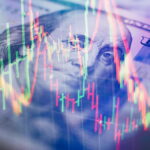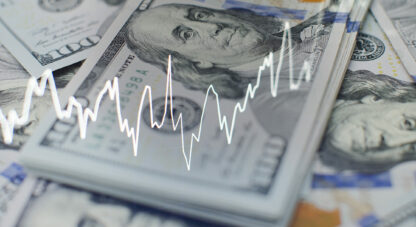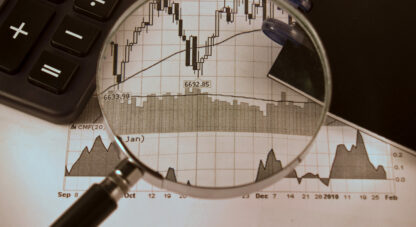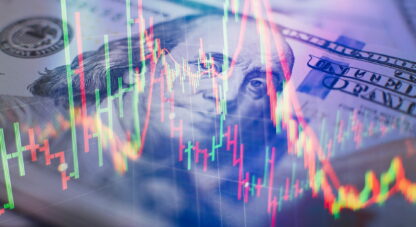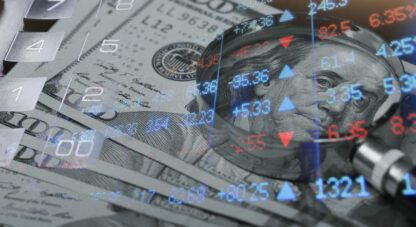The McAlvany Weekly Commentary
with David McAlvany and Kevin Orrick
“I still like liquidity. I like gold in here because of the amount of the debt. The gold is insurance. Gold is insurance against all this debt, it’s insurance against political catastrophe. Trump is a major provocation in the global system, and he just dropped a boulder into a pond, and there is going to some real rocky waves and ripple effects, so you’d better have some hedging in here.”
– Bill King
Kevin: On today’s show we’re going to be talking to Bill King about the Trump effect. He says this is a common sense revolution. China, Japan, the Fed – they’re in big trouble. But gold and the United States – they’re looking good. I always look forward to Bill King coming. I have to tell you, Dave, the question in my mind since Trump has come in is, what are going to be the effects? There is a lot of good that sounds like it is happening. He is acting very quickly. But the destabilization and the confusion as to the direction of a lot of markets, I have to admit, I don’t know where we’re going.
David: Whenever you have a restructuring – a corporation restructures, or in this case, a nation restructures – you have a lot of things that change. And with that comes uncertainty, not only here, domestically. Many good things can come of it, but there is still this sense of uncertainty for a period of time. I think what we captured in our conversation with Russell Napier last week was the idea that there is a bigger picture, and that is, China, the central banks around the world, Europe, Germany specifically – they’re all implicated in our restructuring because the way we’ve done business for 30-40 years has, to some degree, been to the advantage of the global community and the benefits have been spread fairly wide and far afield. That may not be the case with Trump. It may be that the America First policy, very good for us, not good, necessarily, for the rest of the world to the same degree – what are the implications of that? That is very important to figure out.
Kevin: That’s why I think it was perfect that we had Russell Napier last week from an outsider’s viewpoint looking in, and now we have Bill King from an insider’s viewpoint looking out
* * *
David: Bill, it’s great to have you back on the program. I think somehow you must have angels whispering in your ear. It was almost a year ago you were on the program and well before anyone I know, you were convinced that Donald Trump was going to be the next president. Again, I’m not sure where your sources are but you have good ones. I respect that (laughs).
Bill: Well, we did have some good sources as to what was going on with the FBI investigation into the disappearing emails and hacking and whatever, but as far as Trump, it was just, if you look at historic patterns, honestly, he should have won by even a bigger margin, but with all the baggage he had that hurt him. And of course he didn’t help himself in a lot of ways. We thought all along that this was going to be very similar to 1980 and would also be similar to 1968 – 1980 on the economy, 1968 with the protesting, unrest, civil disturbances, and high crime that Nixon tapped into, his Silent Majority. In 1980 with Reagan it was people fed up with the economy, and also Carter’s feckless international policy, all kind of coming together. It just appeared that way.
And the other thing is, it is very difficult for a two-term sitting president party to retain office. If you look at some of the professors that didn’t look at polls, but looked at historical patterns, they had it right. One of the things was, in the 2014 mid-term elections the Democrats lost seats, and that is usually a death knell for the party, if you have the sitting president and that occurred.
And then there were other things going on internationally. This was definitely an anti-establishment, or change – from the polling this was going to be a change election, and Trump fit the bill. I think the other guy who did fit the bill who was in there was Cruz, and I thought that’s what it would come down to was Cruz versus Trump, and it kind of did. And then the Democrats just did not have a good candidate in a change election, something new, and that’s why Bernie Sanders did so well. It just kind of played out the way it should have except Trump should have won much bigger, but again, he had a lot of baggage.
David: We had eight years of Fed accommodation during the Obama administration, and now we have interest rate hike cycles, which don’t usually get going when capacity utilization is at levels like we see now, currently about 75%, normally 80% or higher. So this is kind of a first. We have the auto inventory which is stacking up on dealer lots, so again, going back to industrial capacity utilization, it is probably not going to significantly improve straight out of the gates. What and when are the consequences of these anticipated rate hikes?
Bill: That’s the thing the market is wrestling with. I think it’s why the market has been chopping sideways since December 9th, which was kind of the peak, so for 2 ½ months we were really doing nothing but chopping around. And you’re right, they’re digesting that. They’re digesting Trump after the euphoria when he got elected. But when you’re talking industrial production, a lot of these numbers and inventories do not have the same meaning that they had in the past because watch the industrial production numbers in China, or Mexico, or Vietnam? What are their inventory levels? It all contributes together but the international aspect, the globalization now is different.
And where is the inventory? It used to be if it sat here in the U.S. then you had a real problem, but now it could be sitting in Mexico, it could be sitting in China, it could be sitting on the high seas with the way that people move freight, with the containers and the vessels at sea, there is a lot of that going on now. I understand what you’re saying, but it’s not just so much a supply issue now, because as you alluded to, with the eight years of accommodation by central banks there is a lot of inflation fuel out there, because of that money. And what Trump is trying to do, and he said it, he was pretty clear. He wants to help Main Street. He doesn’t care that much about Wall Street. It is a reversal of what we’ve had for a decade, or more.
That’s the problem. When the Fed created all this money it never got into the real economy. We know that. Even back to Bush, when he did a lot of his tax reforming, accelerated depreciation, after 911, and when he and Greenspan feared that depression was coming after the great stock bubble under Clinton burst, and then he had 911. But that didn’t happen. The corporations in the U.S. bought back shares – massive repurchases. And if they did do any capital expenditures it was offshore. It wasn’t happening here, it was happening in Mexico. It was happening in third world countries. And we did have that third world boom. It was happening in China.
So, we’re trying to do a restructuring here. Trump is trying to do a restructuring, and if the money does start coming back into the real economy, then you do have the problems with inflation. So the central banks have created all this money. It went into speculation, it went into share repurchases, it went into financial assets. And it did not get in there, so it didn’t spark the inflation that you normally would have. That is what the Fed is fearing. The Fed hears Trump. They understand what he is trying to do. And the outrageous thing that I see here is that in October Janet Yellen was saying, “We should let the economy run hot, let’s not be quick with rate hikes.” Just this last week she said, “We’d better start hiking rates because we can’t let the economy run hot.” What changed?
David: [Federal Reserve Bank of Richmond President Jeffrey M.] Lacker’s saying the same thing. “Let’s go on a faster rate hike path.”
Bill: So what has changed? Because she said, “It’s okay, we should let the economy run hot.” Now, “No, we can’t do that.” So, is she being political? Absolutely, to a degree. She shouldn’t have said anything in October, waiting for the election. What was she trying to accomplish? Just sitting here looking at what the Fed is doing, what they have here, they’re kind of winging it. They kind of understand what Trump is trying to do. They got caught, the last two years being political, not hiking rates when they should have. Now they’re trying to make excuses, but they’re killing themselves because the Fed tends to run their mouths too much, so they’ve left a nice track record for people to compare what they were saying. And she has a problem because of what she said in October. Now she’s trying to change course.
The other thing is, of course, you’re seeing industrial commodities are picking up. We were just talking about getting the money into the real economy, the industrial economy, more infrastructure. You’re seeing today that he is meeting with automakers, the executives, and he is telling them he wants more plants here in the U.S. and we will cut regulations. This is what is very interesting. If you’ve listened to people over the years, corporate executives, one of the reasons there was not more infrastructure spending was because of rules and regulations. It is just far too expensive to build plants, and it takes years to do it.
Trump is trying to streamline that. If that happens – you’re seeing today copper is up over 2%, the iron ore, and some of these other things, which in the past have been largely controlled by China, when China was buying commodities, and one day quit buying them is what made these things dance around. Trump just today was talking about he wants more automaker plants, he signed executive orders to facilitate the construction of the Dakota Access Pipeline and the Keystone Pipeline. And he also signed an order that it has to use U.S. steel on the pipeline sections that are in the U.S.
So these things, all of a sudden we see the steel makers doing better, we’re see this going on. And this is going to create a dynamic, and the Fed is understanding that, that they are so far behind the curve. You don’t actually hear them saying that. They’re not saying, “We’re behind the curve,” they’re saying, “We have to make sure we don’t get behind the curve,” which tells you, that admission is, they fear they are behind the curve. And they fear that if you start getting the commodities and the construction going, and that multiplier effect with employment and wages, they’re going to really look bad. Because what will happen is, the inflation will start going, rates will start going, the long rates will go without them. They will have to try to catch up with the short rates because these curves will be steepening.
And then what happens is, if they stop the expansion, Trump and everybody will blame them. And they’re in a really tough position. I think today I saw that if you look at some of the bond markets, some of the instruments and inflationary expectations are at a 2½ year high. So the question is exactly right on, that’s something the markets are having to wrestle with. That’s why you see gold, very quietly, has gone up to a two-month high. I think it’s getting close to almost $100 off its low. And it’s acting like it did last year where it took off at the beginning of the year from an over-sold position that occurred at the previous fourth quarter.
So it’s going to be an intriguing year. The big unknown is, how “Trumponomics” plays out. So far he is doing what he said he was going to do. The thing, though, is you can’t throw all your eggs in the basket because of what is going on with China. China is really struggling. They’ve been trying to peg their currency, they’re trying to keep people from pulling money out of the country, out of the system. They’ve been pouring reserves in – record amounts of reserves trying to stabilize the banking system. In addition, seeing some of the data coming out, their lending is surging. They’re trying to play this game where they’re trying to stop lending into the housing market because the housing prices are going up so far, and speculation, and they don’t want political revolution, but the housing pricing is getting away.
But on the other hand, they’re trying to keep the bubble economy inflated so they don’t have rampant unemployment. They’re trying to keep that going by lending like crazy into the economy. It’s a very tricky game they’re trying to play. Any miscalculation or misstep, and that is going to be a major issue. And of course, you have Trump now hammering on the Asian exports. He is making the case that we’re going to put tariffs on, it’s U.S. first, we don’t care about what’s going on over there. And so, when you’re looking from a China perspective, everything they have going on, all the problems they struggle with, they’ve played the funny money for years, they’ve tried to keep the expansion bubbling up, and now they’ve got the tiger by the tail and at the worst possible time they get a guy like Trump coming in talking about implementing policies that will impair their exports.
The other interesting thing is what he is saying about the tariffs. If you sit down for a minute and look at it, he has made two judgments here. One is, all these analysts, or idiots, whatever your terminology is, on Wall Street, who said if Trump is elected stocks are going to fall 30% and we’re going to have a crash, and the global economy will be in depression because he’s going to start a trade war. Of course, the market went up. It did the absolute opposite. That shows you how smart they were. But what Trump believes is, we’re already in a trade war, and it’s hard to argue that when you look and see what has happened. He’s talking about gutted out factories, gutted out cities, massive unemployment, on and on, and it’s easy to make the case that we have been in a trade war. The other part of that trade war is the currency wars, where the Asian exporters keep debasing their currencies. He understands that.
What U.S. people have done, especially the globalists here that we’ve had from Clinton, Bush and Obama – they thought they would play this war in the currency market, which brings the Fed in because you’re talking interest rates. That was part of the QE. We had all the competitive QEs because everybody wanted to base their currency so you could export and help your economy. But Trump – to me, what it appears he is doing is, he is saying, “I’m not going to play that silly game. Why should I debase the currency? There is a dynamic. Everybody gets hit with that. Let’s just put a tariff on. What’s the difference if we debase the currency 10%, or if we put a 10% tariff on China?”
Well, he understands that if he debases the currency 10% there is inflationary aspects. Also, you’re killing the U.S. purchasing power of American citizens’ savings. So let’s just use the tariff to single out one party, and that way if Germany plays with us, and China plays the right game, they’re not getting hurt by the currency. The currency devaluation impacts a broad number of people. This way we can single out countries with the tariff and we don’t have to play that silly game, we don’t have to worry about the consequences of that.
In some ways it is like when 1989 the San Francisco Fed President, Heller, said, “Look, when the stock market crashed in 1987 we just started pumping money into the system, the dollar went down, and then we have to worry about sucking all that up. Why are we doing it? If our concern is that the stock market has collapsed, why don’t we just boost the stock market, use futures, or whatever, and that way we don’t have to worry about all that ancillary damage in this wide net we’re casting?”
This is, in a way, what Trump is trying to do here with trade. That’s why he got rid of TPP and NAFTA. He doesn’t believe in this type of trade deal where you’re doing a blanket deal for a region. He wants bilateral, one-on-one deals. And I can understand. I can understand the logic. From the corporation standpoint, they wanted the multilateral deals because it’s just one-stop shop. “Okay, everybody signs on, we all go and do the deal.” But then you play the currency wars, you play all your other games. But if you’re making one-on-one deals, it’s like negotiating with a football team. “Okay, we’re going to give all you guys this money,” as opposed to one-on-one you cut your own deals, type of thing.
So, this is a drastic change. We don’t know exactly how it’s going to play out, but there are going to be a lot of different implications. So, you’ve seen the markets rallying, a pretty strong rally here, and it’s a persistent rally. It’s not like usually where traders jam in on the opening, and then they chop around. We opened modestly better, we’re just slowly going up, and I think a lot of it has to do with the news that’s going in the tape, Keystone pipeline, you’ve got Toyota now talking about putting 10 billion into the U.S. and creating 400 jobs in southwest Indiana now or northwest, whatever it was. But you’re seeing this stuff moving forward, meeting with the auto dealers and the headlines that are coming out. So there are a lot of headlines on the tape today about the industrial U.S. economy doing Trump projects – the pipelines, which will create jobs, not just the pipeline jobs but the oil industry is saying, “This allows us, then, to build some other infrastructure and it will stop some bottlenecks in our delivery systems and distribution systems and storage systems.” Again, that means jobs. And the key is the rules and regulations that you might start seeing. The infrastructure boom – people think, “Oh, he wants to build more roads and aqueducts or different overpasses and bridges.” It’s not that. The infrastructure is also all these other things – different terminals for distribution and distribution facilities and whatever. So you’re seeing that in the market today a bit.
David: You’ve got, though, the market, which is judging a rate of return on capital, and what we started out by saying is that he is going to be a lot more help for Main Street than for Wall Street. So you go back to that difference between who you favor – labor versus capital – and if the moves that he is making actually favor labor, the middle class, flyover states, are more positive and proactive at the level of jobs and maybe even economic activity, still it seems like Wall Street should be looking at this and saying, “This is less profits for us as it is more opportunity and cash flow, ultimately, to the man in the street. Again, Main Street versus Wall Street – Main Street wins. If Wall Street loses, why is the stock market just as happy?
Bill: One thing people are looking at is that if Main Street wins, Wall Street, historically, has won. That’s how it used to be. The stock market was a gauge of U.S. economic activity. And then in the late 1980s and 1990s, basically under Greenspan, and then again under Bernanke, they looked at the stock market as an engine of economic growth with the wealth effect. The establishment couldn’t believe that Ronald Reagan was right with his economics. And they actually starting writing this up that, “Oh, the reason for the economy boom wasn’t because of Reaganomics, it was because of the stock market boom.” And everybody felt good and they felt wealthy.
That’s why when Bernanke testified in front of Congress and they said, “How do you know QE works?” His first response was, “Well, the stock market is up.” That tells you that’s what he wanted. They thought, “We’re going to create this boom by getting stocks up.” So what Wall Street is thinking here is, “Well, if Main Street does better, then we will have the organic growth in the economy instead of the steroidal growth we had. If we get real growth, people have money in their pockets, these companies are going to be doing more commerce, there is more construction, yada-yada-yada, type of thing. What we don’t know, though, is if the stock market was trading 30% lower it would be real easy to rationalize a good rally.
But the problem you have now is you’re at near historic extremes for valuations. So you can see the economy doing much better, stocks going nowhere or actually going down, especially if interest rates start ticking up. And if the interest rates tick up they’re going to put more money in American consumers’ pockets. That’s been my argument with zero rates and the negative rates, is that you kill interest income, you push people to hoard money, people sit on their capital, especially retirees and people on fixed incomes. You create that negative effect and it’s going on all over the world.
So Wall Street right now is not seeing any negatives. All they are seeing is positives. The biggest negative out there is historically over-valued and the Fed is starting to move rates up. And don’t forget, Trump is not a Wall Street guy. That’s the problem. Over the last decade or so every time you talk about a businessman or somebody, people are thinking Carl Icahn, or Larry Fink, or Warren Buffet. They’re all Wall Street. They’re all stock guys. Trump is not a stock guy, he’s a real estate developer, so he is not concerned about the stock market world that these other people are always focused on. He just thinks that you just do what is best for the economy and let stocks take care of themselves.
David: Wall Street wants the best of both worlds. It wants the old school – if Main Street wins, then Wall Street wins. But they’re still holding onto a highly geared, highly leveraged system which is vulnerable if rates start coming up. Can you have it both ways? Because certainly they are going to create some economic activity, but long rates go up. If there are two bright lights maybe it was autos and housing, and most recently, National Association of Realtors Affordability Index goes to its lowest level since 2008. So you have home prices which are high, now mortgage rates are moving up with interest rates. What does that do to real estate? These are a few bright spots. Maybe you can overcome that from an economic standpoint.
Bill: Again, just look at the stock market. Wall Street wins because there will be more issuance of bonds, there could be just the whole need of capital. That’s why you are seeing these banks which are largely Democratic in their philosophy. Big government was always good for banks, historically, but now all of a sudden you see them talking about Trump because increased economic activity means more transaction fees, and that’s what drives the economy, the number of transactions. So Wall Street – the other reason they got religion is that retail just poured into the market. Since 2008, for the eight years the Fed has been trying to get stocks higher, the average guy in America has been selling stocks into it.
Now when Trump got elected you had record inflows into ETFs coming in, for stocks. That’s one reason we got this thing over-valued is because the retail people are thinking, “Wow, it’s going to be good for the economy, it’s going to be good for me. I feel really good, let’s buy some stocks.” So, you’re right, there is going to be a transition and we don’t know how fast this thing can play out. What you’re alluding to is, Wall Street is way ahead of itself, much like they were with Reagan, and that’s a very good comparison. You ran like crazy, and then you took a really big whack. From April 1981 to July, you went down over 30% to July of 1982. You went from over 1,000 down to 6-something, I believe, and that was very painful. And it’s a very high probability that will occur again. But eventually what happened was stocks boomed, but you had to get through that.
And that’s what Wall Street is thinking here. They’re looking for the boom. They’re not looking at what might happen with the transition period. So yes, it’s a very difficult call for stocks right here, and that’s why, again, we’re trading sideways. People like what they think is coming, but they are understanding rates are going up, we are very extended on valuations, and how long does this take before the economy really gets going? And you mentioned with the eight years of easy money, are we on fumes, economically?
Just like Reagan, do we have to roll over, take some of the hit, take some of the purge of the abuses of the previous administration before all the new things finally take hold and you get what Bernanke was begging for – the green shoots of an organic economic growth. You’re right, it could take awhile, and stocks are expended, but you can’t run out and make some really empirical decisions or statements because this is really an unknown area. My feeling is we’re probably getting close to making peaks in stock, and then you have some kind of significant pullback and retrenchments while all this stuff plays out. I do think it will take awhile. I do think it will be more like what happened in the Reagan transition.
David: Right. Every president since Eisenhower has experienced a recession sometime in the first two years in office.
Bill: Obama didn’t get it because the bottom was when he came in. Well, January, the stock market bottom was February, the economic bottom was probably April or May, so he didn’t get it. That was largely what you said is eight years of easy money. So we’re really overdue.
David: The same thing happened with President Erdogan in Turkey. He came in at the market bottom and everybody thought he was an economic miracle worker, and he got lucky! He got lucky.
Bill: Exactly.
David: So in that sense, can Trump avoid a recession?
Bill: No, I don’t see how, because the one benefit Reagan had – when Reagan came in you had very high inflation. You had Volcker trying to kill it. You had very high interest rates. So when Volcker finally relented in July of 1982, that’s when Mexico and Brazil called up and said, “We’re going to default on the debt.” So he said, “Okay, that’s it, enough with killing the inflation.” You then had the biggest bond market rally since the Civil War. You had short rates at 22% and that long bound was 14.5%. When that stuff started coming down, you talk about what you did for housing and mortgages and construction, that was an unbelievable kick. And that’s not going to happen. In fact, Trump’s going to get the opposite. He’s going to get higher rates, which Reagan didn’t get.
The other thing is the debt. It’s so much higher. That’s what we don’t know. That’s what is sitting over on China, and that’s what’s over-sitting us. When the rates start moving back up and all this debt – what happens? Where does this thing go? To me, the real problem with Trump could be the opposite of Reagan where you get a surge for 12-18 months, and then it just rolls over because everything is exhausted. As opposed to when Reagan came in, you got the whack, called the double-dip recession. I think it was one long recession but they called it a quick two-dip recession. And then you came out and things started booming again.
So that’s why I tend to agree with you, this thing is much dicier. It’s a much more difficult environment right now. And the other thing you had is, you didn’t have China sitting out there with all their problems, and Europe with all their problems, and the banking system problems. That’s a big difference here. But I think that’s the other thing Trump is trying to do with America, he’s trying to isolate the U.S. from all these other problems, and he doesn’t want the entanglements, which is another reason why Bernanke was so reckless with the monetary policy and why he threw a couple of trillion dollars into European banks, because of the entanglements with our banks.
So Trump just looked historically at what was going on, and people say, “Well, Trump has changed his mind. Five years ago he was against this or that or whatever.” Trump is a real estate developer and businessman. He’s just looking at the information he has and he is trying to figure out how to play this thing more as a business as opposed to a philosophy.
David: Yes, we’ve got budget deficit issues. I’d like to see a tax cut, and there is a good possibility, if you look at the demographics, certainly, over the next three to four years, Medicaid, Medicare, Social Security continue to go up. So some big line items rising as much as four times in the next four years. And we don’t have the petrodollar recycling. We don’t have the trade dollar recycling. Or at least, that is in question in terms of our foreign trade surpluses building in China, and what not. We throw on tariffs and start a trade war, enter into a currency war with various places around the world – how do we finance our deficit?
Bill: The same way you’ve been doing it, because where are you going to go? Trump understands what the average American understands and the globalists didn’t want to say. We’re losing the trade war. There is a trade war. We have 600 billion dollars a year, whatever it is – we’re losing it! We’ve been losing since 1987. 1987 was the year the U.S. turned from net creditor to a net debtor. Up to 1987 the U.S. was getting more money from their investment – U.S. corporations were bringing more money back into the country from their fixed investment in companies. By 1987 the money was pouring out. So you’re talking 30 years of losing a trade war.
And that’s what Trump is saying. “What are you talking about a trade war? We’re in a trade war. If you want to start shutting it down – fine, because then we quit losing money.” That’s one of the reasons why the dollar rallied so strongly when Trump got elected, because if you stop the dollar flow – I just it looked up, we’re going to run a 70-75 billion dollar trade deficit with Germany. The Germans are going out of their minds about Trump because they understand what happens when he starts putting tariffs on BMWs and Mercedes and Volkswagen. That hurts. And that also encourages other people to start doing the same thing. Because you’ve been told for 30 years you can’t do that, we’ll have a trade war. You’re in a trade war, and they’re killing us, and he’s right.
And that’s why we have this huge deficit, because every time they come in here and take a job away, somebody goes on welfare, they go on disability, they go on the government dole, and the big corporations don’t care because they still get money to buy products. And so Trump is telling companies, “We’re going to take the people off the government welfare, off the disability, off whatever, and we’re going to give them jobs, because you guys have been dumping consumers onto government. You’re doing the opposite of Henry Ford, where Ford said, “I’m hiring people, and they can buy my cars.” We’ve been doing the opposite – dump workers, or bring in cheaper workers, put other workers on welfare, put them on disability, and you know what? If I’m Walmart or McDonald’s or General Motors, even though you don’t have a job, you still buy my product because you get the freebies to buy the products. Trump understands that dynamic and that it’s going to end.
He also understands, the money is pouring out of here. You want a trade war? Fine. I was taught this 30-40 years ago – one of the reasons U.S. companies have never had the motivation to export like the Asians is because the U.S. is such a great market, you didn’t really need that. Anything you did overseas was a bonus, where Asia must export to feed their massive populations. China, India, Indonesia, Japan – the size of these countries, their populations – they must export to feed themselves, and to be able to bring in raw materials, or you’ll have revolution. Trump understands that. “We’re doing a trade war. We’re tired of this. You guys have been kicking us in the groin for 30 years, so I’m going to start kicking you in the groin. Now, if you want to play fair, we’ll play it fair, but if you’re not, you know what? If I have to put on tariffs and you can’t bring those products in, that’s fine. Eventually, some U.S. company will pop up and produce those products. There’s nothing you guys are producing that we need that we can’t do ourselves.”
And that’s the beauty of the United States. Except for some semi-rare, some strategic metals, we’re totally self-sufficient. Agriculture, energy – and that’s the big thing to watch here is the energy, because if he starts cranking – the pipeline, the shale, some of the natural gases, more drilling up in Alaska, up near the Arctic circle, the people that really should be concerned here is OPEC, because once that starts going, it totally changes the dynamic in the Middle East also, in the geopolitics of this.
So to me, that’s the thing that’s really – I understand the infrastructure – but if he really goes hard for this energy – and Trump isn’t just a petro guy. He has made it clear he wants all forms explored – geothermal, solar. That’s why Elon Musk has been visiting Trump and talking oil because Trump wants to pull out all stops on this so we would not only be self-sufficient, but to become a major exporter of energy. To me, that’s the really exciting thing here.
David: Looking at risk, we don’t fully know what tax policies are going to be, what regulatory changes will be, what he can succeed with, as you just mentioned, the changing nature of geopolitical relationships. And I understand the desire to think positive and sort of allow the new president to maneuver, but it seems like the market is operating with more certainty than it actually has on those matters. Does that just kind of go back to that point of, maybe the market is ahead of itself?
Bill: Oh sure it’s ahead of itself. Absolutely. But what the market is looking at and seeing is, we’re actually going to do things that make sense economically and politically, as opposed to what somebody has as a philosophy. This is a common sense revolt. This is an Archie Bunker revolt here. Why are we sitting here worried about giving jobs to Mexico when we can’t feed our own people? Or we have veterans here that are left dying and wasting away and we’re worried about bringing other refugees in here. That doesn’t make sense to the average guy. Now, if you have some philosophy, or you have a globalism thing, or even if you have a religious bent, the charity begins at home routine is what Trump is saying here. And that’s why it’s a common sense revolt he’s trying to do here versus the Ivy League sophistry. “Well, we can’t have a trade war.” “But we’re getting our brains beat in, what do you mean? We’re running this enormous deficit.” “Oh, that’s okay, that’s actually good because of … comparative advantage! Yeah, yeah, that’s the ticket. Remember that economic theory?” Trump is a businessman, and he says, “This is what works, this is what doesn’t. I don’t care about your theory. I don’t care about Bernanke’s theories for 40 years. This is how the world is.” That’s kind of the relief here.
Again, all these idiot economists – and sorry for the redundancy here – that are running around with what was going to happen when Trump was elected, the big thing they miss is the reduction in regulations. Any businessman you talk to, small or large – they’ve been getting killed on rules and regulations and bureaucratic red tape. Anybody who has had economics – you have your ISLM curves, you have this model, you have that model – I want somebody to tell me when you’ve seen a model come in that accounts for regulations and rules. Where is it?
Well, you can’t, because economics is pseudoscience to begin with, it’s not physics. And they try to do mathematical models like this amount of tax cut, and this amount of money supply gives us this amount of GDP. And it’s garbage because you don’t have psychology and you don’t have rules and regulations because you can’t quantify. How can you quantify the effect of lower rules and regulations? But that is part of what is going on.
The other thing that is going on here is – I don’t want to call it a carrot and stick approach, but again, common sense – he’s telling Apple and all these other companies that have a trillion, or whatever, offshore because of taxes, “I’m going to give you a tax holiday, and I’m going to lower your taxes, but you’re going to build your products here.” And that’s what he’s saying. “It makes no sense, you have all this money, and you’re sitting in it offshore, and you won’t do anything with it except buy back your own stock. And you don’t even actually bring the money back, you float bonds against that here so you can still leave the money, and you buy back your own stock. But here’s what I’m going to do. I’m going to give you an incentive to bring that money back, and I’m going to cut your taxes. But you’re not going to go on playing this silly game of keep repurchasing your shares, you’re going to build plant and equipment here. And the way I’m going to ensure that is, I’m going to put a tax on everything you’re bringing into this country.”
So that’s what he’s trying to do, you can see that. That’s, again, why you’re seeing the excitement here, especially in some of the tax stuff. They hated him, they wanted Hillary in, virtually all the money from Silicon Valley went that way, but now upon further review they’re thinking, “Oh, well, this actually will be good for us in the long term.” The question is, what happens in the transition? Because it’s not going to be seamless, it’s not going to be that smooth. So I do believe the market is way ahead of itself, but it’s very happy today.
David: If we said, “Okay, this is a major change in American politics and maybe a healthy shift away from purely academic theory into a world of business practice, and you’re right, seamless transition – there is some execution risk, we don’t know exactly when things are going to get done. But overall you could say, “Well this is a bullish thematic, not necessarily for the stock market, but for the economy.” If this is such a bullish thematic, why wouldn’t we just say, “Hey, let’s skip out on gold altogether? Yes, it’s been performing well since the beginning of the year. It did last year too, as you mentioned earlier.” But frankly, who needs it if we’re talking about a brave new world here in the United States?
Bill: Well, because, we have to think the gold way. Unlike a stock, like IBM, or Intel, or General Electric, gold is truly a global asset. Everybody can own it, everybody can participate in the valuation, and everybody can use it. And that’s the thing, again, we’re talking about seamless – if Trump pulls this off, what is going to happen to China, Japan, Germany?
David: That’s not good.
Bill: It’s not good for them. And that’s what he’s saying, “We’ll have bumps here. You guys are going to have a lot more than bumps.” We’ve sat here for eight years of the financial crisis, and even the central bankers that created the problem, and then were trying to rescue it said, “We need restructure, we need reform. We’ll keep pumping money like crazy.” And the politicians just don’t have the incentive to do it, because it’s a tough choice. They get thrown out. You can’t keep running your welfare state and borrowing forever. And that’s what Trump will do, is force them to change.
What was the whole restructuring? For Asia, it was to get your domestic markets going, increase your own demand there, so you’re not solely reliant on exporting to the United States and to Europe. That’s the restructure. And for Europe, it’s get off your butts and start manufacturing, doing things, get everybody to quit the 30-hour work weeks and the two-month vacations and the early pensions. You guys are going to have to start producing more. You can’t just rely on Germany to produce goods and then support the EU welfare state. This is what Trump will do, and that’s why they’re going out of their minds, the foreign leaders. He’s going to force them to do something, or they’re going to collapse.
So what’s going to happen? We don’t know. What likely will happen? Some will make the reforms and the restructuring. Others won’t, they’ll get hammered. There will be global turmoil, political, whatever. That’s one of the props under gold. It’s a factor with China, Europe – it’s not just the United States. That’s why I think gold gets to be a tough call once it gets around $1250 and above. I think when it gets lower it’s cheap, but from a U.S. standpoint, what was going on here. But as it starts getting a little bit higher and you’re thinking of higher interest rate risk, I think it puts a little bit of a top on gold until we let this thing play out. But you can’t too far over your skis, here. I think the stock market has gotten way over its skis. But this is going to take time. It’s going to take a transition.
I think one of the reasons you’re seeing the rally, and it’s kind of funny reading the headlines – “Trump signs executive orders, allows the pipelines, fulfilling a promise.” (laughs) It’s almost like they’re stunned he’s actually doing what he said he was going to do. And I’ve read this commentary the last two days. Now that Trump is in and he is actually sending these executive orders out there and pushing these policies, it’s like, “Oh, he really means this. Oh, he is really doing this.” That is, I think, why you’re getting the rally and the Dow Transportation is up 1.5%. It’s the strongest sector by far. Again, the reason is, that’s the most economically sensitive.
You do have earnings this week and you’re getting good earnings and that helps also, because companies are reporting solid earnings. But this, again, is the “so far, so good” type of thing that the market is seeing. When does it end? I think, just like Reagan, he did okay in January, and then he started pulling back hard in February, and then late March into early April you ran up again, then you rolled over. I think that’s not a bad algorithm to follow right now. It’s been holding very closely to the election. The trajectory of the stock market has been very similar to 1980, and I think you can continue to watch to see how this thing plays out. But it’s not as easy as the stock market is telling you how easy it’s going to be.
David: We’ve seen some of the Fed chiefs voicing concerns over national debt and fiscal policy, which is interesting because they were pretty quiet during the Obama administration, and it makes me wonder, what kind of market machinations can the Fed trigger? Let’s call them Janet-generated declines. What can they do, as sort of a buffeting? You have Trump, who says, “Well, I’m going to do this and that.” You may have a different political agenda, people with different sets of ideas – again, theories. You have 700 Ph.D.s at the Fed, and they’ve got a different set of ideas. Why not raise rates, create a little pain and try to create some discrediting of the man in office?
Bill: Because there is a difference. The political environment is against them. You ask the average guy in the street – you ask the average person on Wall Street – 30 years ago who the Fed presidents were, or who the vice-presidents were – everybody knew Volcker, of course, because of what he was doing, but very few people knew Preston Martin was the vice-chairman and they didn’t know who the presidents were in the districts. Nobody cared, because they weren’t that big of a factor. But then once you lost the U.S. economic growth that really was running the stock market, you got into financial engineering. Wall Street hung on every word. You have some little idiot Fed official that says something and the market jumps all over the place, and they’re really not that significant, but they try to tell everybody, “Well, it was ego out of control.” And the one thing that they didn’t see, and they are realizing now, Greenspan was knighted in England. “Oh, he’s the smartest man ever.” Come on, please. Everybody who knows the guy knows that’s not true. The guy is a horrible forecaster of economics. He always has been. Then the bubble blew up, and all of a sudden he wasn’t such a genius. Then Bernanke came in, and then he’s going to save the world from depression. And then he killed the average American, and just the whole routine, the concentrated wealth and income that hasn’t been seen since the robber baron days in this country. So all these guys are blowing up. And all you have to is look the opinion polls. The fed is right down there with the media and Congress as far as approval.
David: (laughs)
Bill: People are fed up with them. So they understand this. You might have the high and mighty on Wall Street give them money and kowtow to them, bend down and prostrate themselves in front of them, but the average guy does not like the Fed. They hate the Fed, in fact. They know. And you have a different administration. They’re going to get audited. The Republicans are putting this bill through. Not only that, Trump hates the Fed. He’s told you that. He’s told you who he hates at the Fed. They don’t feel bulletproof now. They’ve got a problem.
They also understand that because they screwed up. They kept the Obama economy going, and they should have been raising rates in 2012, instead of giving you QE 3.0 they should have been hiking rates, but it was an election year and it looked like a tough election and they didn’t want to fool with that. Then they just kept the game going. Remember all that, “Well, we’re going to raise, we’re going to raise. No, we’d better not raise.” The stock market, the volatility that was going up and down with the taper tantrums and whatever.
Now they’ve got a problem, because if the economy starts picking up you’re going to get inflationary pressure. Again, we have all this inflationary fuel that they laid out there. They want inflation. They want inflation. Well, you’re going to get it. The problem is, they understand, you get the real economy going, you’ve got all this inflation fuel out there, and they’re behind the curve. They know it. The fact that they’re saying, “We’re concerned we’re behind the curve, might get behind the curve,” tells you they already know they’re behind the curve. They see it in the expectations, they see it everywhere.
And now they’ll take the hit. If the economy starts going, and the commodities start really flying – you would think oil would go down today with all the pipeline news and Trump’s policies, but it’s going up. And part of it is because they just think that demand is going to start going crazy. And if it starts going, then the Fed is in deep, deep trouble. And a number of the Fed presidents are up, and I think five of the seven governors are up this year or something. I was reading, in the next 18 months these people are going to be gone. They’re going to be replaced.
But the thing is, they’re going to take the hit. They’re going to take the political hit and they have people who want to punish them now, where in the past they were hands off. Everybody in the Congress understood that the Fed, easy money was their ally because they didn’t have to make tough decisions. They could give you everything you want and not move your taxes to the moon. Now it’s the opposite. And that’s why the Fed guys were so arrogant because they knew we were papering over all the policy mistakes that Congress makes, and papering over the gutlessness of the Congress for not making the tough decisions. And Trump came and said, “I’m going to make the tough decisions. I’m directing Congress, so I don’t need you.”
And now they’ve got a problem. And you notice now, you don’t see them around as much, talking as much. Even Draghi made a very dovish speech the other day. Stocks tried to rally and immediately rolled over. They’re not the game. The central banks aren’t the game anymore. Trump and China are the game going forward.
David: Central banks are still making a market in European bonds and in Japanese stocks and things like that, and there is a footprint in the market. I asked you earlier about the U.S. bond market and how we would finance their deficit. You said, “Well, where are they going to go? Are you talking about folks overseas representing significant traffic into U.S. treasuries just because you look at the chaos overseas and it’s the best place to be?
Bill: Exactly. That’s always been the case, but you get concerned. When the bonds get hit there is concern. Just like in 1979 and 1980. They saw Carter moving away from a leadership role. He let the Sandinistas go in Nicaragua, he let Russia go into Afghanistan, he let the radicals take over Iran. And people said, “Oh, he has withdrawn from the U.S. stage,” which is what Obama did. Obama said that. “I don’t like America so strong.” Huh? Excuse me? So that becomes a problem.
And just what you were saying is true. You’ve got all this chaos going on in China. That’s an interesting dynamic. China has been selling U.S. bonds like crazy to support their financial system, because they need the dollars now. So that kind of worked for them that they were able to build a reserve, but the people in China don’t want the yuan. They want out of it. They’re afraid it’s depreciating. And it’s going to depreciate more with Trump coming in. So you’re right, when you get a strong leadership – that’s what happened with Reagan. Reagan had a problem. He came in now as you cut rates. And the dollar started roaring.
And when the dollar goes up foreigners want U.S. assets. They buy U.S. bonds and stocks. That’s probably another prop you’re getting under the market here. So you have a lot of Europeans, and especially the globalists and the leaders in Europe, the solons there, they don’t want a strong United States. They want a weak United States, except when we have to come and fight a war for them, then it’s different. But by and large, they want to be the big cheeses, and the big chiefs, and they don’t want the U.S. to exert influence over them.
But Trump is doing it the opposite way here. You could see this in the early stage of the rally, that we saw this really strong buying for the first two hours of the session, and that was the Europeans because Europe closes after two hours of the New York Stock Exchange time. Europe closes 11:30 Eastern time. And then you would see that nice, early rally, and then the Europeans went home, their orders went home.
You even see that with the Asians. They trade usually the first half-hour or hour. The Asian orders come in and then they go, but the Europe exchanges close 11:30 Eastern time, so you could see that there is a big component. Now that worked against Reagan because the dollar got so strong and the bonds were rallying so much and stocks, that’s when they had the Plaza Accord in the summer of 1985 to cut the value of the dollar.
The one thing Trump is getting here is, the dollar has backed off. The one fear was the dollar was just getting so strong that it would undermine anything you wanted to do as far as the policies with imports and trade that would just absolutely hamstring them, but it’s kind of rolled over here. And the bonds have weakened a bit, too, today.
But the market just continues to chop, and nobody knows how this is going to play out. It’s going to be a process. But for the time being, people are looking for all the roses and they’re not thinking about any of the thorns that are going to come up with this rose bush. I think we just keep playing the 1980, early 1981 algorithm, we’re tracking it very closely, but at some point something bad is going to show up and then we’ll see how the market tolerates that.
David: Yes, volatility – it’s been virtually nonexistent for the last month, month-and-a-half. The trading range – the tightest band over the last month in stock market history. What does a lack of volatility communicate to you?
Bill: Confusion. When you get confused, you withdraw. The stock market has become a market of traders and fast money and financial engineering. In the past, the market was run by real investors, and then the parasites would nibble around the edges. Well, we’ve turned where the parasites are out of the market. And of course, when Trump got elected you saw investment grade money come in. Institutions came in, public came in. The institutions might not have been bullish, but when your mutual fund all of a sudden after eight years of redemptions, all of a sudden you see money flowing in, you know what’s coming (laughs). You know you’d better get in the market.
And it keeps coming, and you’ve got to get ahead of that. So you start committing. And we did that. And then, again, December 9th was kind of the momentum top, and then we’ve just been tracking sideways. Right now we’re trading up near the highs of some of the major indices, which is what we’ve done in January, and even late in December, and then we’ve backed off. We’ll see if they go through tomorrow. But small – when you get very narrow bands, traders and investors are pulling away. They don’t know what to do. They don’t want to short because they’re afraid of a day like today popping up. They don’t want to get long because they understand this is very over-valued.
And this is going to be a tricky path. Technically, people say, “Well, the market is coiling for a big move.” Yes, that’s correct, but on the fundamental side what is lurking is uncertainty and indecision, and then people move away. And they’re waiting. That, I think, is the most prudent thing now is to let this thing play a little bit. The Dow, previously, I think was down five of the last six sessions, or whatever, six of the last seven. So it was time to get some kind of bounce-back rally. On a very short-term basis you were oversold. On a long-term and intermediate basis you were historically over-bought, but on a short-term and a trading basis, you’ve been down for a week-and-a-half or so, so this makes sense that you’re getting traders jumping around in here.
But there are a lot of good headlines going on today about what Trump is doing and anybody that is short, you’re pushing them into the market here today. But this is highly uncertain. And again, if we were 30% lower here I think it would be a pretty easy decision they should be looking to get long stocks, where now it is a much more difficult decision.
David: Yes, I was interested in your opinions coming into the election and I’m kind of glad we waited to have the interview until after the election, because this has been an absolutely fascinating setup.
Bill: Oh it is, yes. Absolutely. They talk about the Reagan Revolution, and it was big, because he was peeling back a lot of the welfare state, a lot of the theories – economic, social and financial theories – that had sprouted up in the previous 20-some years. Trump is doing the same thing, but it is even more so, because he had no political background. The way he ran the campaign, the viciousness, the way he has gone after the media, and the way it continues to be vicious.
Reagan was the Great Communicator. He was your uncle that came in, laughed, told you a joke. If he needed to drop the hammer he would, but he was kind of that easy-going, likeable guy. Trump is the opposite. Trump is just confrontational. He fits the mood of the country. The country is mad, it is upset, it is confrontational, and it wants change. And we’ll see if they like it when they get it, though (laughs).
David: Right. Well, if you could fast forward four years, and he is wrapping up his term, and Bill King decided, for whatever reason, to just take a break. Markets are busy, crazy, and communicating all kinds of divergent signals, and you had to put your money somewhere for the next four years, and wake up four years from now, or re-engage the markets four years from now with another transition, where would you put money today? Asset class opportunities and vulnerabilities?
Bill: I would have a very balanced portfolio, because the uncertainty is so high. Again, because this is an unprecedented campaign, unprecedented election, this is an unprecedented environment, and he is trying to really do unprecedented things. Remember, Reagan had some conservative philosophies, no question. But he was a globalist. He was another one with the free trade. He was the guy that started the movement for immigration from Mexico to pour in, and he’s the guy that turned California from a Republican state into a Democratic state because he bought the argument. He brought in George Bush and the globalists and the East Coast elitists, the Rockefeller wing of the Republican Party. He wanted to be the great uniter for all of that.
Trump is the opposite. So to me, this is, you had better have a portfolio of – I still like liquidity, I like gold because of the amount of the debt. The gold is insurance against all this debt, it is insurance against political catastrophe. Trump is a major provocation in the global system. The U.S. is by far the biggest player, and he just dropped a boulder into a pond, and there is going to be some real rocky waves and ripple effects. So you’d better have some hedging in here. The thing to be the most careful of is the bond market. I think you’d better be really short in your duration there because things can change so quickly.
I would be careful with the stocks because they are so extremely over-valued. I would be very careful. I think you have to do your work and try to have a diversified approach also. But I’d be really careful, especially with some of the social technology stocks that are really stretched and over-valued, but I think you have to be balanced because this is just a very, very difficult environment, and again, we’ve just had an unbelievable disruption into the market system. And anybody that is an engineer understands when you have systems and you get a historic disruption in there, I don’t know how good your models are, but there are going to be some problems here that people are not seeing.
David: Eight years of sort of fending off a deflationary trend or threat, and what are the odds at this point of an inflationary surprise, and has Wall Street or the average investor kind of accommodated that in their portfolio allocations at this point?
Bill: Well, that’s what the market is looking at. And remember, stocks like inflation in the beginning, and you’ll see Buffet and these other people, that’s the bet they’ve made is stocks. The best hedge against inflation is a good business that can pass on those costs. The problem is, can you do that? That’s what Buffet has always made that. Where you run into problems is when the inflation starts impairing the economy, and the long rates go up and the central banks have to react. Then you get killed.
But if anybody was learning, previous to 1980, anybody who went to business school where you learned portfolio theory, it was very easy. You buy bonds and you buy stocks. And when the economy is going good and you think you’re getting inflation – it was actually, go back and look at your classic textbook – if you think you’re going to get inflation, you buy stocks, and you sell your bonds. And then the other corollary is, when things get really good, and the economy is doing too well, you sell your stocks, and you buy bonds. Because when things are going good, you don’t want many partners, so you buy stocks. When things are going too good and you want to get rid of risk, you want a lot of partner, so sell you stocks and buy bonds.
That is kind of what I think is playing out here. The market – you can see it – they keep talking about the reflation trend. You can see it in the bond spread, you can see it in the commodities, and that is part of what is driving the stocks. You see it in material stocks, but the transportations made an all-time high in July 2008, and we were at least two-quarters into recession and crisis. If the stock market is so prescient, and if transportations averages are the best economic tracker, why was that going on? Because oil was at $140.
And transportations do well when there is inflation – that’s why Buffet bought Burlington Northern, because when there is a big inflation, your grains, your oil, your commodities go and the rails make more money. Rails are kind of an ersatz inflation play, and that is part of what is going on here, too, with the transports. They’re just going berserk. Again, by far, they are the only index up more than 1%. They’re up about 1.6% now.
And the market is smelling inflation, and the Fed is finally figuring that out but they look like complete idiots. They should have been hiking it, and they didn’t because of the election year, the same thing they did in 2012. The Fed has a very big problem right now. So you have a big metal rally, you see the metal stocks, Freeport is at its highest level since 2015. The market is telling you, “We expect inflation,” in kind of a big way here.
David: Well, we could go on for another five hours, and we should do that over lunch in Chicago.
Bill: Oh, any time, David.
David: Thanks for joining us in our conversation today.
Bill: Oh, any time, David. Thank you very much.
* * *
Kevin: Dave, being somebody who watched All in the Family as I was growing up, I remember the Archie Bunker statements. He couldn’t believe the ridiculousness of the way society was changing. I would say that is what Bill King is talking about Trump looking at, with globalization, and he is rejecting what we have seen for the last 50 years.
David: It’s why the man-on-the-street is saying, “This kind of does make sense.” It is the Archie Bunker revolt. No, there is not a seamless transition, as things change from the world that was to the world that may be, and there is a reason to keep your eye on the ball. There are many positive aspects of what may occur, and maybe some unintended consequences. Regardless, it promises over the next four years to be a fascinating show to watch.



